Carmen in Warsaw - 2004
|
|
|
|
|
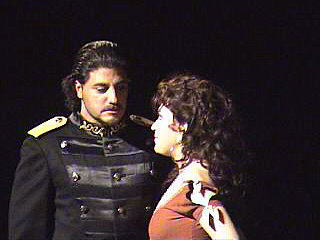
.jpg)
.jpg)
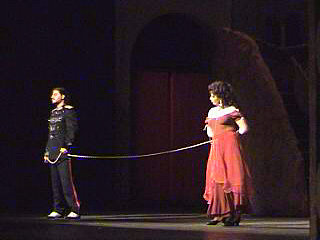
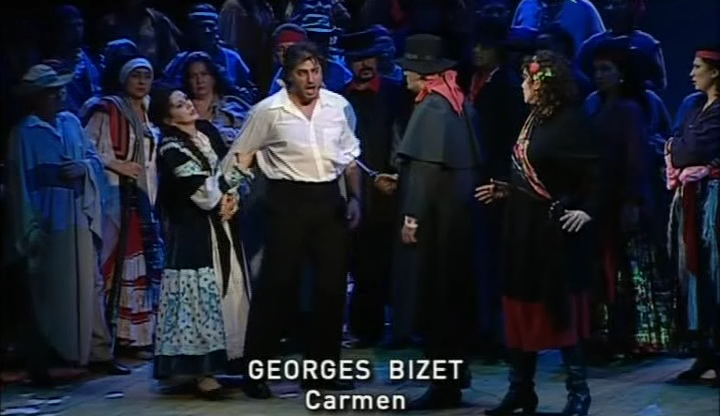
.jpg)
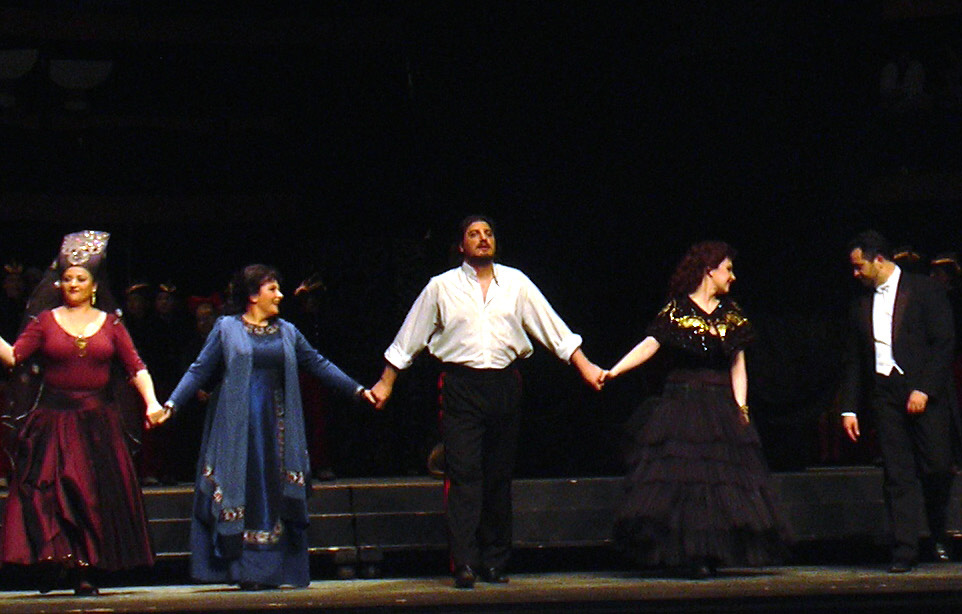
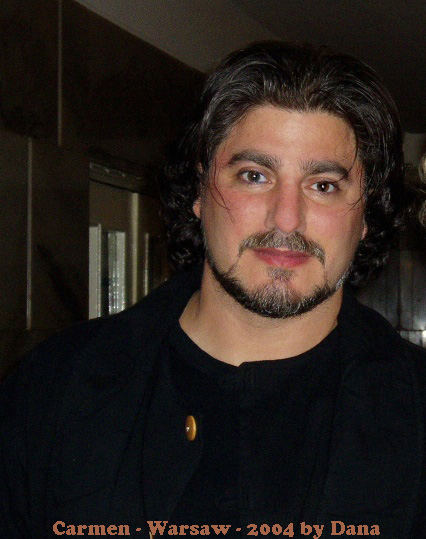
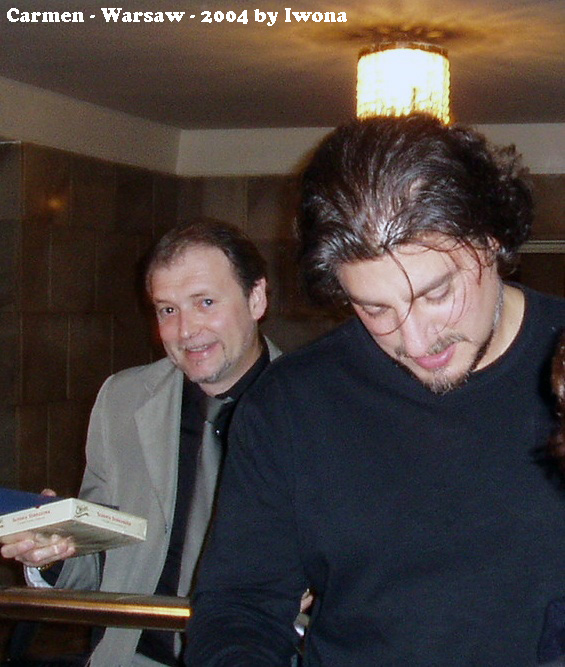
Bravo Cura
Celebrating José Cura--Singer, Conductor, Director
Operas: Carmen
|
Carmen in Warsaw - 2004
|
In Concert - Rijeka, July 2006
|
Flower Song Video |
Rijeka Concert July 06 - Carmen Flower Song
|
|
Seguilla Video |
Rijeka Concert July 06 - Carmen Seguilla
|
Bucharest 2007
|
Carmen Pursinge Cotidianul 18 October 2007
José Cura’s Don José shocked the audience with his machismo, nerve, and intensity The National Opera of Bucharest offered Saturday, within the framework of the Enescu International Festival, a show from their own repertoire, but with four guests from abroad—and the name José Cura filled nearly 1,000 seats in the hall. José Cura amazed the audience with his machismo, intensity, and interpretation. But if many were expecting to see a romantic Carmen, the Gala performance on Sunday must have taken them by surprise. Cura’s vision, in absolute agreement with that of the Israeli mezzo soprano Hadar Halevy, turned Bizet’s opera into a passionate and exciting performance, putting particular emphasis on the character of Don José. From Cura’s perspective and as shown successfully in Bucharest, although Carmen is a French opera it captures the world of Seville through the violence of its characters. Cura’s Don José is an arrogant man, but in accordance to the natural instincts of a time in which machismo males could not easily tolerate the behavior of someone as free and powerful as Carmen, who first humiliates [Don José], then seduces the one-time Spanish soldier: to Cura, the murder at the end of the work is not an act of jealousy but a natural response of a strong man who has been subjected to deep humiliation. Two scenes in particular create a breathtaking performance: that of the third act, when Don José is called away by Micaela to visit his ailing mother—the violence on which Cura draws can almost read it on the face of Halevy—and the final crime, when the intensity of Cura’s performance erases any trace of theatricality, as if he had brought the boiling blood and nerves of Don José on stage…
|
|
Carmen at the National Theater Radio Romania Luminita Arvunescu 10 September 2007
First, a personal observation: we are a duplicitous public—unhappy in our breaks, gossipy even, but at the end, generous with our applause. Second, a detail that I hope will not offend anyone: José Cura, the famous Argentine tenor, a true star of today for whom the public ran last night to the opera—his Otello is magnificent, his Canio and especially his Samson exceptional, but his voice still seems ‘too heavy’ for the role of Don José. His character starts as an assassin, without a trace of naivety….. Otherwise, what was seen in the first of four shows hosted by the National Opera of Bucharest under the current administration of the International Festival George Enescu? A nice, impetuous José Cura with great artistic experiences, a singer with class, intelligence, and one who knows that “characters must be solidly built, because the stage has no mercy and you can fall at the speed of a meteorite,” an artist who probably anywhere would be surrounded by a magnetic field outside of which opinions are subject to mysterious forces and ultimately, his celebrity. No wonder then that it was just him and about him that the public ovation, minutes and hours, unleashed and unrivaled; and besides whom the Carmen mezzo-soprano Hadar Halevy was unexpectedly dominated. A success with the effect of a triumph for ….José Cura!
|
|
Screen Grabs
|
||||||||||||
| José Cura, the Male Callas, at the National Opera House Radio Romania Muzical Mihaela Soare 9 September 2007
One of the best tenors of the moment, José Cura, will perform this evening at 6:00 PM in Bizet’s Carmen at the National Opera House. With the physique of a gladiator, at age 45 Argentine Cura has been appointed by the international press as “a creature of the theater, a masculine version of Maria Callas.” His career began after leaving his birthplace, Rosario, Argentina, in Verona where he made his debut nearly 30 years ago. His voice, with its dramatic overtones and explosive dynamics, let him to a wide repertoire. He has starred in Otello, Turandot, Stiffelio, Samson, and now plays Don José in Carmen. Tonight’s performance promises to be one of the great events of the current edition of the George Enescu Festival. Q: Some of the partners with whom you will sing in Bucharest are Romanian whom you still have not met. How comfortable is this? José Cura: It can be difficult, indeed, but we are fortunate in one respect: we have a common language and that is music. So we can communicate easily even if we don’t speak the same language or have the same habits, the same tastes, even though we have different personalities. When we hit the stage, do the same music, we are the same group. That’s great for making music. Q: You do not like to be compared with other tenors. Is being known as the male version of Callas more satisfying? JC: Of course, it is just another way to compare. It doesn’t compare voices, which is something stupid, but readily available from the stage. This is something very different. Q: What do you tell the young people at the master courses your support? What are the most important things, the good and the bad? JC: First of all, respect the truth. There is nothing worse for an artist than to pretend. If you don’t have the benefit of a sense of real emotions, no one will see you. You can have the best technique, the most beautiful voice, but nothing will happen. Q: The wants perfection from the great artists. How difficult is it to resist such requests? JC: It’s impossible to resist. It’s part of the game. The good thing in my case is that I’ve never been perfect. It is true that people expect more of you when you are famous and every time you’re on stage they want you to be the top, the best. But that is not always possible, because you are a human being! The tenor José Cura has conquered the world with him powerful voice and dramatic register.
|
|
The Music Market is like a Grocery Store and We are like Tooth Paste
Cotidianul Cristiana Visan 8 September 2007
He is considered the most electrifying tenor of the moment. José Cura rose quickly up the hierarchy of singers in vogue in the nineties and the cultural marketing never hesitated to promote him as the new sex-symbol of the opera stage. He is one of the few opera singers whose admirers number in the millions—in the case of Cura, we are talking about an audience with an overwhelming majority of admiring fans. In his first day of rehearsals in Bucharest, the tenor agreed to meet with the press, avoiding as much as possible (as with so many other stars scheduled to sing) the endless tiring interviews. Even with all the fame of Cura, organizers didn’t expect journalists to storm the Yellow Foyer of the National opera but as it happened, Thursday was not a day like any other but rather the day when the world received notice of the death of the most popular tenor of the last fifteen years. As a result, a larger than expected contingent of reporters arrived at the Opera, ready for discussion. The tenor surprised both organizers and journalists when at the last moment he arrived accompanied by soprano [sic] Hadar Halevy, who performs the role of Carmen, and Mario de Rose, conductor. “Does anyone have their biographies?” could be heard about at the arrival of the other two, as the press had only been prepared to question a single star. “But what about translations?” asked others who had just learned that English was declared as the language for the discussion. Cura arrives in the Opera foyer fresh from an interview with national television. According to some, he is taller than he appears in photos; others insist he is shorter. In any case, no one could make an ethnic description of Cura: mathematically, he’s 25% Italian, 25% Spanish and 50% Lebanese, but for him what matters most is the country where he was born: Argentina. Finally the press conference starts, with the first words belonging to Valentina Sandu-Dediu, head of the festival’s press office, who requests a moment of silence in memory of Pavarotti: a silence to honor, accompanied by scattering strain of several photographers who rush to capture which of the faces of those present are most solemn. As expected, the first question was about Pavarotti. The questions itself was not unexpected nor that it was the tenor who was expected to answer: yes, it is a sad day for the artistic community but we must be careful not to use Luciano as an excuse to create news. “As a man, I am happy his suffering has finally ended.” As a more metaphorical statement was still needed, Cura played his role well. “If God wanted an angel, he now has one of the best voices singing for him.” Period. Enough of Pavarotti. A change in language, to Spanish, to the dissatisfaction of many of those present. Cura’s quiet reply: he answered in the language of the questioner, in this case, Spanish. Yes, he repeated, this was his first time in Romania and he hoped it would not be his last, and no, he had not gotten a chance to see Bucharest at all, since it was the first day of rehearsals and it was also the day Pavarotti had died so it was far from an auspicious day for a walk through the city. No, he didn’t know the artists he would be performing with; he knew the conductor—his fellow countryman—but he had met the lovely soprano [sic] for the first time. The next question required another change of language, this time to Italian (sighs from others). Cura responded immediately about artists who dare to go to festivals: a few, not everyone, can do it and in this case he knows the work but he would not attempt it with a new work. Carmen has been familiar to him for more than twenty years, since he debuted as a conductor in Argentina until he made his debut as Don José in Europe in 1996 [sic]. “I already know it from all sides so within five minutes of the start of the show I can go and get straight into Don José.” Cura believes the character’s strength means you do not have to adapt to a new auditorium or staging. “On a normal stage, you just do not come across flying saucers or other crazy stuff, so you don’t need to anything more than to get into your role, become the character.” Nor does he believe in the need to put everything in place during rehearsal. “If during my thirty year career I did everything the same, it would be a disaster.” Cura is a performer and it shows: this time, the stage is a press conference and he immediately went into character. Art, after all, is a business as he says: “The music market is like a grocery store, and we are like a tooth paste. Some of us are more in demand than others because some toothpastes are better than others.” He knew nothing about Enescu Festival before being invited to participate. Holender is a friend and he gladly accepted the invitation to come to Bucharest but challenged the Romanian journalists: “You must make the most of this international festival. You have good musicians, you must make it better known.” It is hard not to like him: he has charisma, the Latino’s breathtaking ease of being and he is able to talk about anything. Don’t believe in rivalry between tenors. They do exist, of course, but he is friendly with fellow Argentine Marcelo Alvarez and Roberto Alagna. “With Marcelo, we sometimes go out and like two pigs we eat and drink, though he beats me. We are Argentines, and when it comes to meat and good wine…” So was there anything like the friendship like Pavarotti-Domingo-Carreras among the young tenors? Friendship is something personal but music is a profession. “We are all colleagues. You cannot be an enemy soldier in the camp but the press sometimes creates a theoretical antagonism to sell more copies. It sells better if you say José Cura hates Alvarez and Alvarez hates Alagna than to say we are good co-workers.” He considers himself more of a composer and conductor than singer. He studied these for years before he realized he had a good voice and that it would be much easier to earn a place of honor as a tenor. I asked him about his Requiem, composed more than twenty years ago at the end of the Falkland (Malvinas) War. “I had planned to premiere it in 2007, 24 years after the end of the war, but I couldn’t find any Argentine institution willing to support me.” Romanians would say, “Typical.” Cura wanted to put the work on an opera stage with two choirs, one British and one Argentine. Easy to say, hard to do: the wounds of the war have long healed but still there is rawness; after all, the Falklands (Malvinas) are still recognized by the UN as British territories. In any case, Cura has not lost hope for his composition of the soul: “I hope to put it on stage someplace, even if not in Argentina, before I die.” He returns to English and back to Carmen. He describes his character with the same passion with which he plays him. He does not believe that Carmen is romantic. “The opera was revolutionary at the time and Carmen was the first feminist. Think about it. We talk about the colorful characters from Seville as being ahead of their time. Those women don’t walk around naked because they are whores but because it is 50 degrees in the shade, their clothes were soaked in sweat, and this is all reflected in the great sexual confrontation.” This blazing feminist discourse aligns with how he thinks now while just a few years ago, he says jokingly, he was a "majestic male.” Yes, Carmen has a message the world doesn’t want to see: “The woman can be free and the man, an idiot.” He declares Bizet’s opera to be “a great opera, with the problem of being too famous.” It comes to the last question. Cura had previously worked with two Romanian artists. He sang the tenor lead in La Traviata with Angela Gheroghiu and remains impressed with Leontina Vaduva, with whom he made a documentary about the life of Puccini in 1996. And so he ends with a joke, presenting the following story: “In the scene where she dies in La Bohème, I was moved to tears. The director told me it would make it better if I cried but I said you should not ask me such a thing. This girl makes me cry all the time.” Charismatic, vibrant, conquering. For anyone who already has a ticket to Carmen tomorrow night, satisfaction is half guaranteed: José Cura has been, until now, a nearly perfect Don José on many big city opera stages, so the applause at the Bucharest Opera will probably be extensive.
|
|
|
Karlsruhe 2008
|
|
|
Vienna 2009
|
|||
|
Zurich 2009
|
|||
|
Munich 2009
|
Last Updated: Saturday, April 27, 2019 © Copyright: Kira